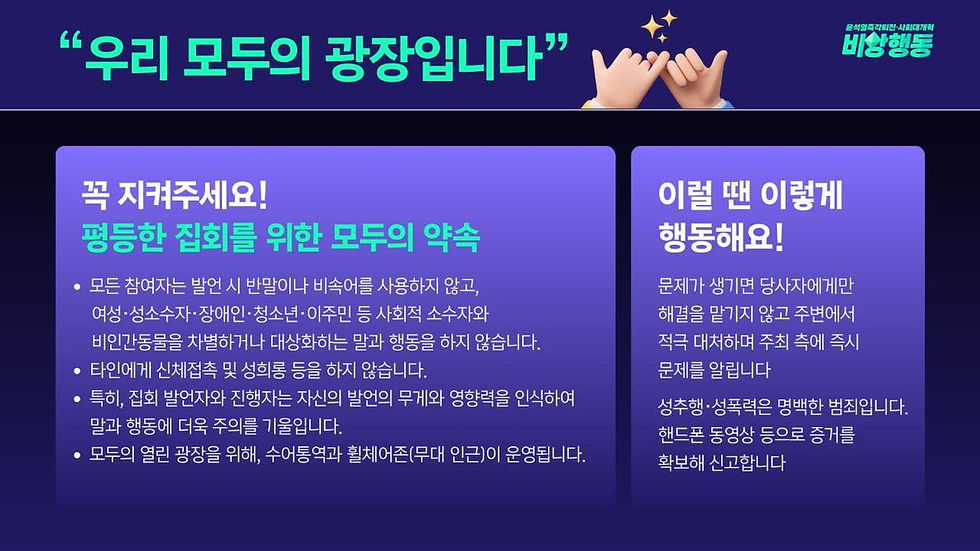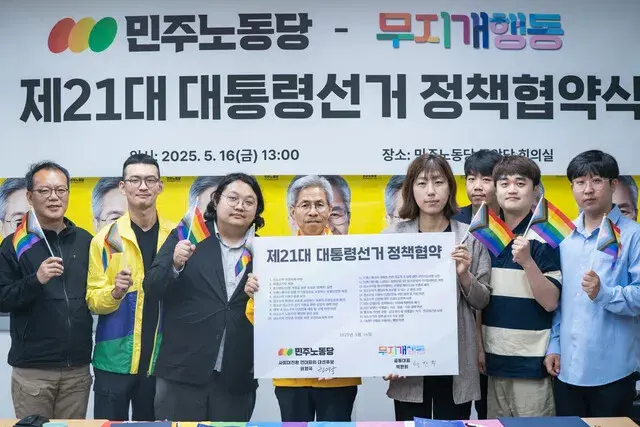Queer People in the Square and the 21st Presidential Election
- lgbtnewskorea
- Jul 8, 2025
- 6 min read
Progressive Politics for a New Korea after the Impeachment!
English Translation: 지니
Translation review: Juyeon
Writer of the original text: 권태
Review and amendments to the original text: Miguel, 에스텔
Web & SNS Posting: Miguel
News Card Design: 가리
On the night of December 3, 2024, President Yoon Suk-yeol abruptly declared martial law. Citizens blocked the military, which had attempted to blockade the National Assembly, so that the Assembly could successfully lift the martial law. Civil society responded by organizing the “BISANG Action for Yoon Out & Social Reform,” mobilizing large-scale protests and various actions until Yoon was removed from office in April. Marginalized groups—including women, LGBTQ+ people, adolescents, people with disabilities, and migrants—gathered in the square not only to demand Yoon’s resignation but also to call for a fundamental transformation of the system that enabled his rise to power. Queer rights organizations launched the “Queer Action for Yoon’s Resignation” and established a “Rainbow Zone” at the protest site. They pointed out how the regime that caused and justified the rebellion had long relied on suppressing queer individuals. They highlighted the urgent need for politics free of hate and exclusion. The rally organizers, a coalition of civil society groups, introduced a “Pledge for Equality at the Square,” and participants actively worked to uphold it. This marked a distinct difference from the 2016 and 2017 impeachment protests against former President Park Geun-hye, where misogyny and youth hate had become significant issues.

The recent South Korean presidential election included these four major candidates: Lee Jae-myung from the Democratic Party (DP), which holds the largest number of seats in the National Assembly; Kim Moon-soo from the People Power Party (PPP), the same party as former president Yoon Suk-yeol; Lee Jun-seok from the Reform Party; and Kwon Young-gook from the Korean Democratic Labor Party. Lee Jae-myung, a former child worker, passed the high school equivalency exam and later worked as a civil rights attorney. Even so, during a visit to Seoul National University, when a queer activist urged him to legislate the anti-discrimination law, he dismissively responded, “Are you done?” As the DP’s representative, he argued that semiconductor industry workers should be exempt from the 52-hour workweek limit to improve competitiveness. Kim Moon-soo, once a prominent labor activist, now actively promotes the suppression of labor unions. Lee Jun-seok pledged to significantly raise out-of-pocket costs for national health insurance and implement regionally differentiated minimum wages. (Each candidate’s stance on LGBTQ+ issues is discussed further below.)
Although queer communities played a more active role than ever in expanding solidarity during the impeachment protests, their voices were scarcely heard in the presidential election that followed the impeachment. Lee Jae-myung, the leading presidential candidate from the DP—which held the largest number of parliamentary seats—demonstrated this exclusion during a televised debate. When asked by Kwon Young-gook of the Korean Democratic Labor Party about the need for an anti-discrimination law, Lee responded, “The urgent issue is people's livelihood,” reflecting a stance that treats LGBTQ+ rights as separate from broader civic concerns. A day after the martial law declaration, activists from the Solidarity Against Disability Discrimination (SADD) participated in an emergency assembly organized by the DP to call for President Yoon Suk-yeol’s impeachment. They demanded his removal in response to his rejection of disability rights budget proposals and his suppression of deinstitutionalization policies. During the event, Lee Jae-myung made the following remarks to activist Park Kyoung-seok, who was advocating for disability rights in the context of impeachment:
“Mr. Park Kyoung-seok over there keeps talking to me like he has so much to say. But Mr. Park, do you really think acting like this at an event like this is convincing anyone? It just makes people resent you more. I’ll give you the mic—say what you have to say, and then stay quiet. I know you’ve been active in the disability rights movement, and maybe that’s why you’re doing this. Let him speak now, but after that, let’s continue in a quieter environment.”
(Source: Beminor, https://www.beminor.com/news/articleView.html?idxno=27237)
Other presidential candidates also showed hostility toward LGBTQ+ rights. Kim Moon-soo, a candidate from the same party as Yoon Suk-yeol and a supporter of Jeon Kwang-hoon—a far-right pastor known for hate speech—argued that LGBTQ+ people should not receive preferential treatment in employment. In doing so, he distorted the purpose of the anti-discrimination law, as if it were designed to give queer individuals unfair advantages in the job market. Lee Jun-seok, who self-identifies as a "young conservative" and is known for his anti-feminist stance, echoed prejudices against the anti-discrimination law. In a televised debate, he questioned Kwon Young-gook on whether the law would ban all forms of discrimination against ex-convicts.
In contrast, there was one candidate who declared he would be a queer ally president: Kwon Young-gook of the Korean Democratic Labor Party. The party was joined by the Justice Party, the Labor Party, labor unions under the Korean Confederation of Trade Unions (KCTU), various civil society groups, and later, the Green Party. Kwon was originally the leader of the Justice Party. For this election, the party revived the name “Korean Democratic Labor Party,” a historic name from the early 2000s progressive political movement, symbolizing an effort to broaden the progressive coalition. As a “lawyer of the streets,” Kwon has long stood with marginalized communities. He has been active in labor agendas, including responding to the SPC group’s repeated cases of labor repression and industrial accidents (Paris Baguette, a major bakery chain in Korea, is part of this group). He also addressed the death of a student apprentice who was killed while repairing a subway screen door due to insufficient safety measures. In addition, he has supported the formation of migrant worker unions and led legal responses to major social tragedies, including the Sewol Ferry disaster. As a presidential candidate, Kwon signed a policy agreement with Rainbow Action, and emphasized that a democracy protected by queer people must now protect them in return.
Rainbow Action, a coalition of LGBTQ+ rights organizations in South Korea, also released the “Demands of the LGBTQ+ Community for the 21st Presidential Election.” These include the establishment of national LGBTQ+ policy frameworks, the enactment of a comprehensive anti-discrimination law, marriage equality (same-sex marriage is not yet legalized in South Korea), and legal gender recognition based on self-determination for transgender people—demands directly tied to the survival and dignity of LGBTQ+ individuals in Korean society.

Meanwhile, in the presidential election held on June 3, Lee Jae-myung of the DP was elected president of South Korea. Rainbow Action criticized both Lee and the DP for not presenting any LGBTQ+ policies and for not responding to the queer rights civil communities’ demands during the campaign. The organization issued a statement urging them to realize “the restoration of democracy and fundamental social reform.” The South Korean Coalition for Anti-discrimination Legislation highlighted the ongoing deaths from industrial accidents and the struggles of workers protesting on rooftops, even during the presidential campaign. They emphasized the significance of the election by calling for the enactment of the anti-discrimination law—one of the most frequently raised demands in the square—along with the protection of gender equality and LGBTQ+ rights.
Although Kwon Young-gook won only 0.98% of the vote, over 1.3 billion KRW (approx. 1 million USD) in donations poured in after the election finished, between 8 PM and midnight on election day. He notably secured 5.9% of the votes from women under 20s—a demographic that had shown strong political engagement during the impeachment movement. The efforts of Korean civil society still go on.
English Translation: 지니
Translation review: Juyeon
Writer of the original text: 권태
Review and amendments to the original text: Miguel, 에스텔
Web & SNS Posting: Miguel
News Card Design: 가리


Comments